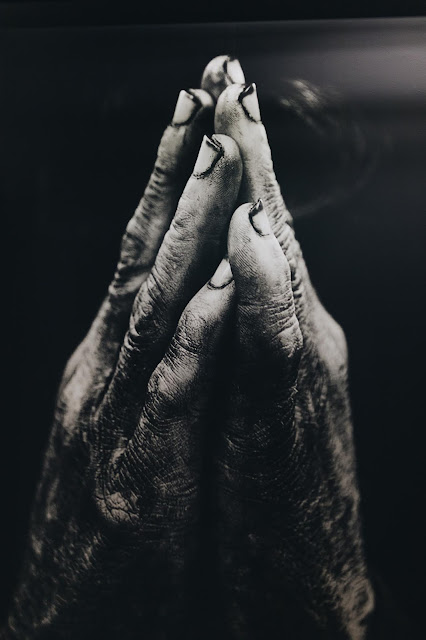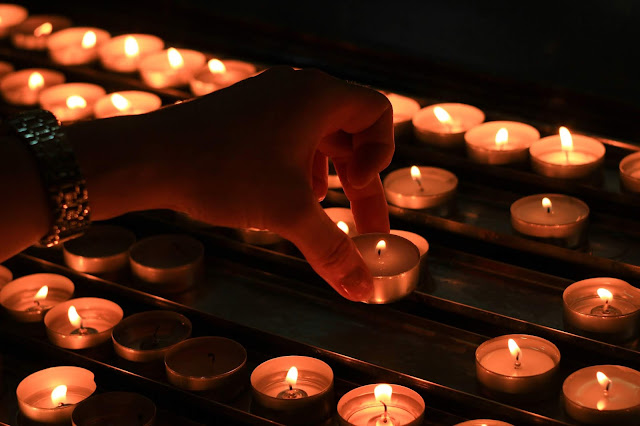 |
The
progression from cultural prayer by the philosophical elite leads into
contemplative examination of the relationship between creation and
creator
Photo by Nathan Dumlao on Unsplash |
Overview of Prayer
Prayer is an enormous source of power. The word prayer is derived from the Latin root 'precarious' which mean 'obtained by begging'. All prayer is a supplication to the Lord.
Essentially, prayer is an act of communing with God or the Divine. Feeling is needed, emotion is needed. For more important than the words, is the vibration of love which they carry.
Prayer begins with talking to God. Later a stage comes when we are silent and He speaks to us. Until we have listened to the voice of God we have not proceeded far on the path of prayer.
Act of Prayer
Individually we may follow our own path. We are guided by Divine Spirit within us in its own way. However we need a point to begin with.Various spiritual traditions around the world offer a wide variety of devotional acts. There are morning and evening prayers, graces said over meals, relevant physical gestures etc. according to tradition, culture and religious guidance.
The German theologian and historian Freidrich Heiler
 |
| Freidrich Heiler (January 30, 1892 - April 18, 1967) |
noted in his Typology of Prayer, six types of prayer, later one more included. Those are
Secular Spirituality
It is most detached from any religious form of prayer of worldly mysticism. Seekers pray to converse with a deity by immersing their presence with world.This secular practice may not include God at all, instead it connects with nature. It is sort of inward meditation with no apparent outward communication. In societies that recognize a sentient God, prayers progress outward. |
Photo by Alina Strong on Unsplash
|
Primitive Prayer
This the most basic petitions to higher beings derive from felt needs and fear. The basics of these prayers focus on deliverance from misfortune and danger. This type of prayers are widely practiced in all facets of life from primitive cultures to superstitious developed world. When such prayers seem to be heard and even answered, the culture is likely to be driven by faith to ritualistic prayers.Ritual Payer
 |
Photo by Frantisek Duris on Unsplash
|
While primitive prayer may be heart felt, once it is recognized for producing results, efforts are made to replicate the effects. Ritualistic prayers derive from such pragmatism in which superstition leads to formulas and litany. In this case the form, instead of content, is thought to produce the results. Many fall into this superstition by ending all prayers 'in the name of chosen deity'. Although it has no mention in the religious teachings. The next progression is recognition of the importance of content over method.
Greek Cultural Prayer
In the Greek culture, more emphasis is placed on the moral needs than physical needs. More precisely this refined primitive prayer sought intercession from Gods for cultural needs instead of individual needs. This type of prayer was often the duty of the philosophical elitePhilosophical Prayer
The progression from cultural prayer by the philosophical elite leads into contemplative examination of the relationship between creation and creator. At this point, the person praying recognizes that naive and realistic prayers may not affect the divine order of the universe.The narrative is 'Why pray?' Any communicative prayer is no longer for petition, as it seems the immutability of God precludes his intercession and prayers turn only to thanksgiving. Up until this level, these five types of prayer seek what man can receive from prayer, from the most basic necessities to transcendent knowledge.Mystical Prayer
At this level of prayer, the person praying recognizes that God is outside of them, but capable and perhaps willing to indwell and unite with them through conversation and transformation.While not biblical, Mystical prayer does contain similarities, such as petition, revelation and elevation of the one praying. Mysticism seeks an illumination rather than intervention and sees this illumination as being revealed in stages.Prophetic Prayer
The highest form of prayer, according to Heiler, is that of the biblical model. In this model, there is no stages, as the ability to speak directly to God without formula or meditation. The prophetic prayer allows all four types of biblical prayer from any believer at any time. No limitations are placed on method, location or liturgical ranking.Our Perspective of Prayer and God's Nature
In order to develop a clear idea of prayer, we must have clear idea of God. Biblically speaking, God is a personal being. This is important and critical to prayer because it means that God is a person we can interact with, that He has a will and that we are able to relate to Him on a meaningful level. If He were impersonal, then prayer would not be meaningful. If He were personal, but uncaring and distant, prayer would not serve a purpose.John 4:8, 16; John3:16 declares
Not only is God personal, He is also lovingThis is also important, in relation to prayer. God is not only loving, He is all loving (omnibenevolent). In relation to prayer, this means that God always desires the best for us because He loves us.
God is powerful (omnipotent), meaning that no prayer is beyond His ability to answer. Luke 1:37 refers
For nothing is impossible with GodThe fact God is all-knowing (omniscient) is also significant to the concept of prayer. In relation to God's omniscience, Jesus said (Matthew 6:8)
Your Father knows what you need before you ask HimBecause of our limitation we cannot explore all of God's attributes, one final one to note, of utmost importance to prayer is God's sovereignty. God is supremely in charge of everything happens in his universe. Nothing takes Him by surprise and nothing happens in our lives without the knowledge of God, even though we may not understand (or aware of) His actions. Isaiah 55:8 - 9 refers
For my thoughts are not my thoughts, neither are your ways, my ways, 'declares the Lord'. As the heavens are higher than your ways and my thoughts than your thoughts.In hearing and responding to our prayers, then, we are assured that God will do so on the basis of His many attributes. His personal nature, love, power, knowledge, wisdom, holiness, immanence and sovereignty all play a role in how we relate to God in prayer and how He relates to us.
What is not Prayer ?
Before we proceed further with prayer after understanding God's nature we must consider what prayer is not. However an exhaustive list cannot be prepared as we have varying nature which differs man to man.- Prayer is not magic
- Prayer does not make demands
- Prayer is for our benefit not God's
- Prayer is not a guarantee against suffering
- Prayer is not an opportunity to show off
John 16:33
In this world you will have troublePeter 4:12-13
Dear Friends, do not be surprised at the painful trial you are suffering, as though something strange were happening to you. But you rejoice that you participate in sufferings of Christ, so that you may be overjoyed when his glory is revealedMathew 6:5
And when you pray, do not be like the hypocrites, for they love to pray, standing in the synagogues and on the street corners to be seen by men
What is Prayer ?
Prayer is a relationship, wherein we humbly communicate, worship and sincerely seek God's face, knowing that He hears us, loves us and will respond, though not always in a manner, we may expect or desire. Prayer can encompass confession, praise, adoration, supplication, intercession and many more.Easy Guide to Prayer
In prayer, each man follows his path, For within each one of us is a Divine spirit, which guides each of us in its own way. But we must make beginning somewhere !
Essentials of Prayer
The very first thing essential to prayer is to select a silent corner, a place where one is completely alone, unlikely to be disturbed, disconnected from the world by switching off the mobile phone computers etc.Timing
What is the best time to pray ? Undoubtedly the best time to pray is the early hours of the morning, when there is a descent of holy vibrations from above.However, some people prefer the quiet hours of the evening, when they feel relaxed after the demanding work of the day is done.
 |
Photo by Naassom
Azevedo on Unsplash
|
Posture
Bodily posture definitely has an influence on our ability to relax and remain undistracted. Therefore, our posture should be comfortable and not a source of tension. We must see to it that the head, the neck and back are in a straight line. We may sit on the floor or a comfortable chair during our prayer.Relaxation
It is essential that we first relax our bodies and let all our tensions melt away. Just relax and let go of everything. Let go of tension, anxiety, worry and frustration. Let our mind and heart become tranquil. Sometimes, relaxation coupled with breathing exercises helps us in concentration.Final Step
Sitting quietly, in this relaxed posture and practicing awareness for a minute or two, we should try to feel His presence within us. Staying in this awareness for a minute or two, we should close our eyes, shut out the world, open our heart and call out Him with deep love and longing of the heart, Now we can proceed with our prayer.Beginning of Prayer
We must begin our prayer by thanking God for loving us.
 |
Photo by Darius
Bashar on Unsplash
|
Sins of Omission and Commission
Now, we may go over all our activities say for the last 24 hours. We will find there are so many things that we did, which we should not have done and so many things we did not do, which should have done - these are sins of omission and commission. We should thank of all these acts and ask God to give us strength and wisdom not to repeat them again.Cultivating Power of Forgiveness
But when we ask for forgiveness, we must remember that we have to forgive others who have wronged us.In the words of the Lord's Prayer
Father forgive us our trespasses even as we forgive those that trespass against us.We can be receptive to God's forgiveness only when we have first forgiven all those people who have wronged us; people who have exploited us; those who have spread scandals against us; people who have taken undue advantage of us. We must forgive them, so that we may be able to receive the forgiveness of God.
By pardoning others we are pardoned
Progression : Wisdom - the Quality of Being Wise
We must remember, the wrongs of yesterday belong to yesterday. Today we are a new person. We are forgiven by God and we must forgive ourselves. Once we have forgiven ourselves, we have opened a direct channel for God. Now we can ask Him for whatever we need. But in true prayer, we must proceed in the right order. So we should ask for spiritual strength, then pray for mental and emotional well-being, Then pray for our physical health. Finally, we may pray for our material needs.Surely, He hears the cries of even His weakest children! When the weakest hand touches the button of prayer, there is no power on earth which can hinder the signal or bar the answer!
 |
Photo by Josh
Applegate on Unsplash
|
Final Thought
A journey of a thousand miles begins with a single step # Believe
Pray, Pray, Pray! But we must remember that our prayer is backed by our life, by our daily actions. If we pray in the morning, as we take up our position on the battlefield of life and oir actions do not bear witness to the prayer that we have offered, we are no better than hypocrite. Therefore, let our actions bear witness! It is actions that God ask us. It is the life that He wants, not words. Therefore let us be with words of the great English Poet Samuel Taylor Coleridge
He prayeth well, who loveth well Both man and bird and beast. He prayeth best, who loveth best All things both great and small; For the dear God who loveth us, He made and loveth all.
Related Article
 |
Cultivating Power of Forgiveness |









